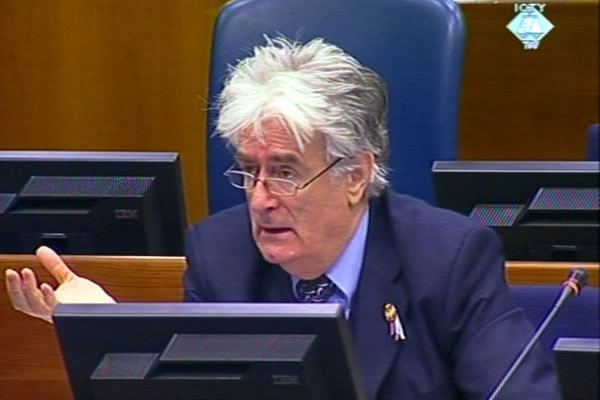Home
‘PROFITABLE TARGETS’ OF THE SERB ARTILLERY
After Witness KDZ-026 completed his evidence in closed session, a French officer who held ‘a high-ranking post’ in UNPROFOR in 1995 began his testimony. The witness confirmed that the Serb artillery in Sarajevo ‘operated under strict control’. The prosecutor illustrated this claim with General Milosevic’s order to ‘use heavy artillery only to shell profitable targets’
 Radovan Karadzic in the courtroom
Radovan Karadzic in the courtroom The trial of Radovan Karadzic continued with the evidence of witness KDZ-026. The testimony went on entirely in closed session. A French officer testifying under the pseudonym KDZ-304 and with image and voice distortion took the stand next.
According to the summary of the witness’s written statement based on his two previous testimonies before the Tribunal in The Hague, the witness was an UNPROFOR soldier stationed in Sarajevo in 1995. That year, the witness noted, the SRK troops constantly used artillery and snipers to target the civilians.
In the summer of 1995, the witness noticed that the SRK added make-shift rockets to its arsenal. The rockets were inaccurate and highly destructive. According to the witness, the rockets could not have been fired from the BH Army positions because the Army simply did not have the capability to fire them. The residents of Sarajevo citizens were totally disoriented and worried about the siege and random shelling, the witness said in his statement.
In the part of the hearing opened to the public, the prosecutor highlighted parts of the statement where the witness says the Sarajevo-Romanija Corps ‘exerted strict control over the fire’ opened from heavy artillery. The prosecutor illustrated the point with an order issued by General Dragomir Milosevic on 22 May 1995, where he orders his units to ‘use heavy artillery only to shell profitable targets and to observe all impacts’. According to the witness, this order confirmed what UNPROFOR could see on the ground.
In the cross-examination, Karadzic shed some more light on the post the witness had occupied in UNPROFOR, saying he would not be addressing the witness as ‘sir’, but by his rank. He was not allowed to do so because of the protective measures. Karadzic then asked the witness about the number of UN units deployed in Sarajevo. The witness replied that "he" had three battalions in the zone controlled by the Bosnian forces: French, Egyptian and Ukrainian. The fourth battalion, Russian, was stationed in the zone under the Serb control. The witness also mentioned that in 1995 he held ‘a high-ranking post’ in UNPROFOR.
In the first part of his cross-examination, Karadzic put it to the French officer that General Milosevic’s order for the use of heavy artillery presented by the prosecutor only shows that there was ‘uncontrolled fire’ and that the SRK commander was trying to put everything under his control. It is a ‘misinterpretation’, the witness retorted, explaining that the commanders of larger units made decisions on what degree of freedom to give their subordinate units depending on their assessments of the situation.
In an effort to show that Sarajevo was a ‘militarized city’ and that Serbs were firing on military targets, not civilians or UN staff, Karadzic went on to indicate the disposition of brigades, command posts, artillery positions, fire points, logistic bases and observation posts of the BH Army 1st Corps in the city.
Karadzic will continue his cross-examination of the French officer tomorrow morning. The accused has asked for 18 hours to cross-examine this witness but was granted only three.
Linked Reports
- Case : Karadzic
- 2011-01-17 KARADZIC ASKS FOR ANOTHER THREE-MONTH BREAK
- 2011-01-14 KARADZIC: ‘SARAJEVO WAS BESIEGED FROM THE INSIDE’
- 2011-01-13 ETHNIC CLEANSING AND HEARTLESS DAY IN SARAJEVO
- 2011-01-19 SUFFOCATING SARAJEVO
- 2011-01-20 KARADZIC: CIVILIANS WERE NOT KILLED DELIBERATELY
- 2011-01-25 KARADZIC AT WAR WITH ‘UN ARMY’
